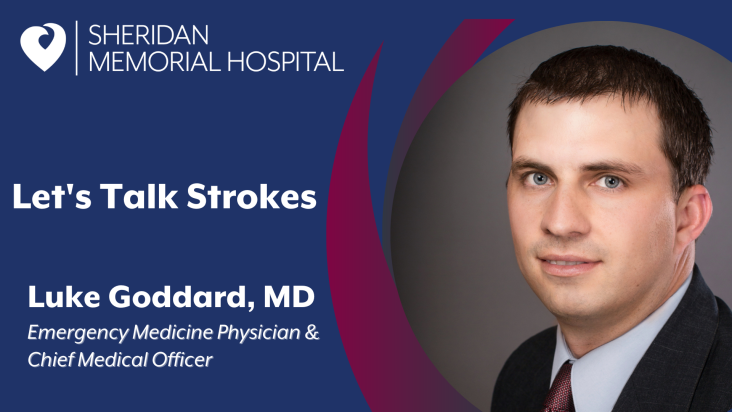By Luke Goddard, MD – Emergency Department Physician and Chief Medical Officer at Sheridan Memorial Hospital
May is National Stroke Awareness Month with a goal to increase awareness around this very important public health problem. It is estimated that up to 150,000 deaths related to stroke occur each year in the US. That equates to 1 in 19 deaths, making it the 5th leading cause of death in our country.
Because many of the available treatments for stroke are time-dependent, a stroke is a medical emergency, and it is important to seek care as soon as you or someone you know develops signs or symptoms of a stroke.
A simple acronym to remember the most common signs of stroke is FAST.
F – Face drooping: ask the person to smile, does one side droop?
A – Arm weakness: ask the person to raise both arms, does one side drift downward?
S – Speech difficulty: ask the person to repeat a simple sentence, are the words slurred?
T – Time: if the person demonstrates any of these symptoms, call 911.
Other common symptoms include sudden dizziness, trouble walking, loss of vision, or sudden headache.
It is important to know that if you or someone with you is experiencing stroke symptoms, you should call 911 right away. The prehospital professionals at our ambulance service: Wyoming Regional EMS, have extensive training in the recognition of strokes and are able to activate resources at the hospital very quickly – even from your home. Because of this communication with EMS, we can anticipate your arrival at the hospital and be ready to care for you.
Once stroke patients arrive at the Sheridan Memorial Hospital, they are greeted by our team of professionals who are specifically trained in the diagnosis and treatment of stroke. When necessary, we also have the ability to connect via telemedicine with a stroke neurologist (a doctor who specializes in treating strokes) 24 hours per day to help make treatment decisions. In recent years there has been significant progress made in treating strokes using intravascular therapies performed by specialized physicians in larger hospitals, which may require a transfer outside of Sheridan.
Strokes cause brain tissue to die, which leads to brain damage, disability, and even death. Stroke is the leading cause of serious long-term disability. It is, however, estimated that up to 80% of strokes are preventable. You can greatly reduce your risk of stroke by making lifestyle changes such as stopping smoking, drinking alcohol in moderation, getting exercise, and controlling your blood pressure and cholesterol. Work with your doctor to discuss prevention or treatment strategies to lower your risk of stroke.
Let’s Talk Strokes – Free Community Presentation
Want to learn more? I would like to invite anyone who is interested to attend a free community presentation on Tuesday, May 23, beginning at 10:30 AM at The Hub on Smith, 211 Smith Street. Some of the topics I will be covering include: what a stroke is, the symptoms of a stroke, stroke therapies, and how to prevent a stroke. Be sure to bring your questions. This presentation is brought to you by the Stroke Team at Sheridan Memorial Hospital.

